Peripheral Neuropathy
Electric Cell Signalling(ECS)
Reduce Nerve Pain Associated with Peripheral Neuropathy & Chronic Pain Without Drugs or Surgery
What Makes the Functional Neurological and Functional Medicine Approach Unique in treating patients with Peripheral Neuropathy?
- The Functional Neurological and Functional Medicine Approach: To treat the underlying cause of the neuropathy and rebuild and restore your peripheral nerves to improve nerve and brain function using proven nutritional protocols as well as specific nerve stimulations and therapies.
- The Traditional Approach: Medications are used to cover up the neuropathy symptoms (warning signs) that your nerves are progressively being damaged. They do this by affecting your brain and nerves’ ability to detect the painful symptoms. The medications typically used are anti-seizure drugs which do not reverse any of the damage.
In order to better understand OUR Methodology it’s important to understand how a Functional Neurologist differs from conventional medical neurologists . The key difference lies primarily in their approach to treatment.
- A conventional medical neurologist is typically focused on the diagnosis of structural pathology/disease and utilizes only pharmaceutical and surgical interventions to treat disease.
- A Functional Neurologist views the nervous system as a moldable, changeable entity that can be affected in its function through virtually unlimited types of environmental stimulation and therapies. This concept of the brain and nerves being able to change their function throughout life via environmental stimulation is termed neuroplasticity and is at the very core of a Functional Neurologist’s clinical methodology.
Click here for a great article on the dangers of certain neuropathy medications
We are focused on determining the underlying cause of your peripheral neuropathy
The most common misdiagnosed and underlying causes of peripheral neuropathy are:
- High blood sugar, diabetes or Insulin Resistance
- Chronic Inflammation from:
– Food sensitivities
– Inflammatory Foods
– Poor Omega 3 to Omega 6 EFAs
– High Insulin
– Strengthens and Repairs Bone and Soft Tissue
– Increases Mobility and Muscle Function - A Damaged Back that happened years or decades ago, leads to:
– Arthritis
– Spinal Stenosis
– Bulging Disc - Statin Drugs (cholesterol lowering drugs)
- Chemotherapy drugs
Like a detective, we must determine what is causing your neuropathy.
We look at overall nerve and brain function to determine the severity of your neuropathy and how it is affecting your sensation, your strength and your balance.
The symptoms you’re experiencing depend upon which type of nerve fibers are affected and the extent to which they have affected your function.
The 3 main types of nerves affected by peripheral neuropathy are:
- Sensory Nerves: Those that carry sensations. When these are affected they can cause burning, pain, numbness and tingling as well as poor balance. For many neuropathies, sensation changes often begin in the feet and progress toward the center of the body involving other areas as the condition worsens.
- Motor Nerves: Those that control muscles. Damage to the motor fibers interferes with muscle control and can cause weakness, loss of muscle bulk and loss of dexterity. Sometimes cramps are a sign of motor nerve involvement.
- Autonomic Nerves: Those that carry information to blood vessels. When these are affected, they can cause blood pressure fluctuations, digestive issues, orthostatic hypotension, constipation, urinary incontinence and sexual dysfunction.
To determine what fibers are involved and the extent of nerve damage that has occurred, we do an extensive neurological exam. This exam not only includes strength and reflex testing; we also perform the Toronto Peripheral Neuropathy Grading test. This tests your individual nerve fibers by scoring your ability to detect certain sensations. A perfect score on the Toronto neuropathy exam is a 74. Anything less than a 74 reveals that a person has neuropathy.
It’s important to also understand that when you can’t feel your feet due to a loss of sensation, it will eventually have a negative effect on how your brain functions. Your brain depends upon the stimulation it receives from the peripheral nerves in your body. When that stimulation is reduced, your brain is affected, causing various issues such as poor balance.
Poor balance is one of the biggest issues affecting those with peripheral neuropathy. Many in the late stages of neuropathy need to use a walker or worse are confined to a wheelchair due to such balance. Falls are the number one cause of death in people over age 65 and are very common in neuropathy sufferers. Our neurological exam will pinpoint areas of brain decline as well test your “Limits of Stability” or propensity to fall. We use a computerized balance test known as CAPS™ to score your balance.
We combine the latest research-backed neurological examinations and advanced neurological balance testing for patients with Neuropathy.
CAPS™ Balance Testing:
![caps[1]](https://www.aim4optimalhealth.com/wp-content/uploads/2015/10/caps11.png) CAPS Balance TestingWhen a person has poor balance, almost always their perception of where their body is positioned in space is disturbed. Critical areas of the brain react to information they receive from the nervous system’s sensors or receptors in the body. The brain uses this information to create a somotopic or body map that allows us to have good balance and function as we move through our environment. Damage or poor function in these important areas of the brain cause a person to have an altered sense of where they are in space. This deficit can be devastating to a senior’s ability to walk and enjoy life. The CAPS™ balance and posture stability test uses an extremely sensitive force platform and specially designed software that can measure the otherwise imperceptible and undetectable changes in a person’s balance. These are what are known as their center of pressure and limits of stability.
CAPS Balance TestingWhen a person has poor balance, almost always their perception of where their body is positioned in space is disturbed. Critical areas of the brain react to information they receive from the nervous system’s sensors or receptors in the body. The brain uses this information to create a somotopic or body map that allows us to have good balance and function as we move through our environment. Damage or poor function in these important areas of the brain cause a person to have an altered sense of where they are in space. This deficit can be devastating to a senior’s ability to walk and enjoy life. The CAPS™ balance and posture stability test uses an extremely sensitive force platform and specially designed software that can measure the otherwise imperceptible and undetectable changes in a person’s balance. These are what are known as their center of pressure and limits of stability.
A person’s center of pressure is closely related to a person’s center of gravity, and a person’s limit of stability is how far they can move off of this center without falling. The CAPS™ will generate a report that quantifies a person’s balance and stability. This will provide an objective score that can be compared to normative data for the patient’s age, height, gender or prior CAPS™ baseline. This test is essential in diagnosing poor stability and can be used to monitor progress through care. For more information go to: https://www.vestibtech.com/TBI.html
We use Breakthrough Neurological Therapies to improve your nerve and brain function:
The neurological therapies or stimulations we use are specific and unique for each individual. These therapies are determined by the neurological consultation, the neurological examination and advanced neurological computerized testing. These therapies help restore impaired function by using the concepts of neuroplasticity and the nervous system’s inherent ability to repair itself. They target affected areas with specific activities to activate, stimulate and rebuild neural pathways. These stimulations are aimed at reactivating the nervous system where abilities have been compromised.
Therapy regimens may include:
REBUILDER THERAPY: 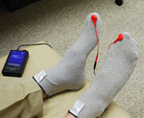
- Stimulates the nerve electrically
– Blocks pain
– Improves blood flow - Stimulates the nerve biochemically
– Allows for greater metabolism and healing
– Reduces inflammation locally - Alternating current between 4400hz to 12,300hz with constant intensity allows for deeper penetration.
- SSEP: somatosensory evoked potential
- Vibration therapy
- Proprioceptive stimulation
- Vestibular stimulation
- Balance therapy
- Advanced muscle retraining
- Interactive Metronome
- Oxygen therapy
Class IV low level laser therapy (also known as “cold laser”) stimulates and increase blood flow to your peripheral nerves:Low Level Laser Therapy for Neuropathy
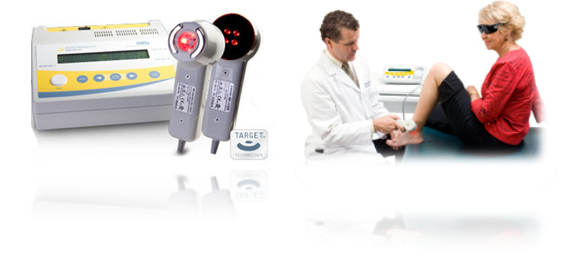
- Laser therapy uses a specific wavelength of light (longer than 800NM) that has been proven to go into the nerve cells and stimulate energy production inside the neuron allowing it to heal
- This light also stimulates micro-circulation and lymphatic drainage
- Increases Circulation and Angiogenesis
- Reduces or Eliminates Acute and Chronic Pain
- Reduces Inflammation and Swelling
- Stimulates and Improves Nerve Function
- Stimulates and Improves Nerve Function
- Increases Mobility and Muscle Function
Biomechanical spinal care takes the pressure off the nerves that are being compressed at the spine: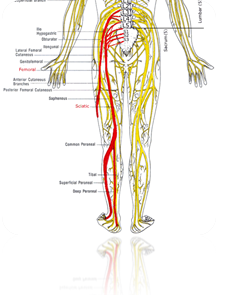
The nerves in the feet and legs that are affected in peripheral neuropathy have their origin in the lower lumbar spine. One of the major contributors to peripheral neuropathy is nerve pressure at the spine. This is termed compressive neuropathy.
It is very common for neuropathy patients to also have spinal stenosis, degenerative/bulging discs, and degenerative arthritis. All of these conditions have one thing in common…Your lower spine is compressed placing pressure on the nerves that go to your feet… Or the nerves are taunt along their pathway. A condition called Adverse Neural Tension.
If we determine your neuropathy has spinal compression as one of the underlying causes your care plan may include one or more of the following spinal therapies:
- Non-Surgical Spinal Decompression: NSSD creates a negative disc pressure and reduces the pressure on the nerves.
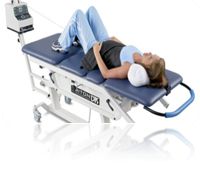
- Spinal Decompression and Neuropathy
- ATM2 (Active Therapeutic Movement): For patients who have back, neck and/ or hip pain when bending or twisting. Your body has a protective mechanism that prevents damaged tissue from being damaged further. Pain prevents you from moving the damaged tissue into an unsafe position. If the spine is unstable, that defense mechanism will remain even when the damaged tissue is healed.
- Biomechanical Chiropractic care and Core Stability Exercises: To correct a poorly aligned spine and to strengthen the muscles that supports the structure of the spine.
We provide Metabolic Care using the latest advances in Functional Medicine to support healthy brain function, reduce brain inflammation, optimize your metabolic health and reduce the triggers that cause migraines: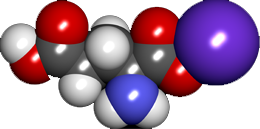
There are specific dietary recommendations and nutritional compounds that can reduce nerve inflammation, improve your blood sugar levels naturally, reduce your need for drugs known to cause neuropathy such as statins and make a better environment for the repair of damaged peripheral nerves. We combine these evidence-based drug-free dietary recommendations and nutritional supplements with our nerve stimulation therapies to achieve maximal benefit for our neuropathy patients.
We base a patient’s specific nutritional needs on their preliminary lab results. The following are some of the lab tests we may run to determine the best nutritional approach each individual patient will need:
Preliminary Lab Testing
- A Complete Metabolic Panel (CMP)
- A Lipid Panel
- A Thyroid Panel
- A CBC (Complete Blood Chemistry with Auto Differential)
- Vitamin and Mineral Testing (Vit D, B12, Calcium, phosphorus etc)
- Inflammation Testing: We test for Inflammation in your system by testing Homocysteine Levels and C – reactive protein (CRP).
- Iron and Ferritin Testing For Anemia
Many people with high cholesterol seen on their lipid panel are given statins. Statins have been studied to be a big cause of neuropathy
A study from the Neurology Journal May 2002 that says that statin/cholesterol drugs increase risk of PN by 1600%
Statins can cause neuropath because they:
- Inhibit the formation of cholesterol
- Cholesterol makes up the “sheath” of the nerve
- Statin drugs also inhibit formation of the CoQ10 enzyme
- CoQ10 is necessary for nerves to function
We can also assess your thyroid, adrenal, immune, blood and gut function. All can be affecting your nerve health. By addressing any problems with your thyroid, adrenal glands, immune system, blood chemistry or gut function, we can help your nervous system to function more properly. The complete metabolic panel allows us to check your blood glucose levels since glucose and oxygen are needed by the nerves to function properly.
Special Lab Panels and Testing
Intestinal Wall Micro CloseupYour preliminary blood testing will let us know if any of the special testing listed below will be necessary in helping you recover from your neuropathy: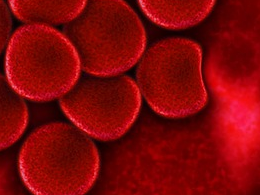
Cyrex array 2-Intestinal permeability (Leaky gut testing)
Many neuropathy patients especially have an undiagnosed underlying auto-immune reaction going on in their body that is attacking their peripheral nerves. Many have a microscopic breakdown of their intestinal wall known as intestinal permeability. This breakdown called leaky gut will cause the small intestines and colon to become inflamed and porous most of the time without GI symptoms. An inflamed and leaky gut will cause overall body inflammation and lead to an inflamed nervous system. This is often an underlying cause of neuropathy. A leaky gut is also associated with driving a hypersensitive immune system attack on the nerves. The Cyrex Labs specialized immune testing for intestinal permeability will determine if you have leaky gut and if so what specific type. There are 3 types of leaky gut, and each has a specific treatment approach.

The Gut-Brain Connection:
The gastrointestinal system is known as the “Second Brain” and has just as many neurons as the brain itself. Our 2 brains- the one in our head and the one in our bowel- must cooperate. When they do not, then there is chaos in the gut and misery in the head-everything from “butterflies’ to cramps, from diarrhea to constipation.
Michael D. Gershon, MD author of “The Second Brain”
Cyrex array 3- Advanced gluten sensitivity testing
Neuropathy sufferers that are also gluten sensitive may have excess gut and nerve inflammation from gluten sensitivity. Food sensitivities can drive the autoimmunity seen in immune based neuropathies.
Cyrex array 4-Food sensitivity and cross reactive food testing:
Neuropathy sufferers may also be sensitive to multiple foods beyond gluten. This test will pinpoint what foods are causing excess gut and nerve inflammation. (See CYREX Gut Brain Immune video tab on website)
Stool Microbial Ecology testing
for intestinal bacteria, yeast, parasites and dysbiosis. Eliminating intestinal inflammation will help to reduce overall body and brain inflammation
Adrenal Stress Index (ASI)
We can further test your adrenal glands with a test called an Adrenal Stress Index. Your adrenal glands are your “stress” organs, meaning that they react to stress. If you have been or are currently under stress, this test may be important! When your body’s cortisol levels are abnormal, it is a sign that your body’s sympathetic nervous system is over-firing. Abnormal cortisol levels can be corrected via specific neurologic and nutritional protocols
Note: Not all of the special tests are necessary for every neuropathy patient. Every neuropathy patient is different. Each patient will have specific recommendations for special tests based on their initial exam, preliminary blood work and their unique set of health complaints. Preliminary blood testing will help determine if any of the special lab panels explained above will be necessary for you.
Specific Nutritional Protocols
These specific nutritional protocols are based on your neurological testing, your blood work findings and your special lab panels. Our goal is to provide the nerves with the best metabolic environment to support and obtain the best results from our neurological care. These protocols are designed specifically for you and may include any of the following:
- Anti-inflammatory diet
- Specific diet and supplement protocols for leaky gut correction.
- Liver detoxification
- Specific diet and supplement protocols to decrease brain and gut inflammation and decrease chronic pain
- Non-drug protocols for high blood sugars, diabetes, hypoglycemia and high cholesterol
- Natural protocols for hypothyroidism
- Nutritional protocols for abnormal adrenal (stress gland) function
- Specific diet and supplement protocols for autoimmunity
- Food sensitivity diet recommendations
